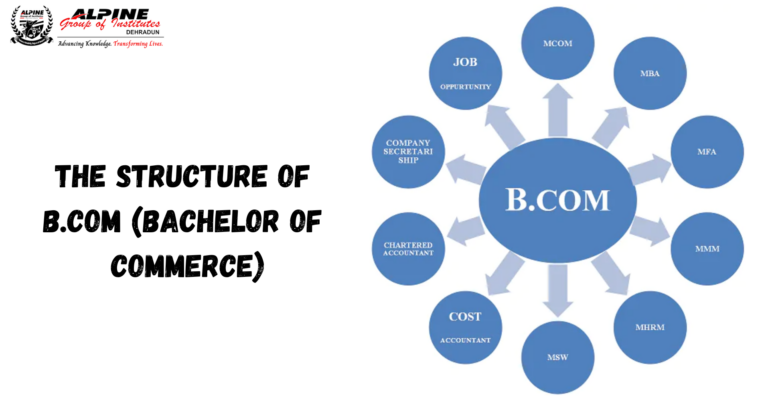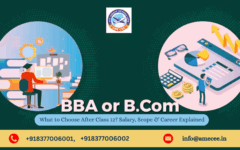The Structure of B.Com (Bachelor of Commerce)
2024-12-04 9:04The Structure of B.Com (Bachelor of Commerce)
The Bachelor of Commerce (B.Com) is an undergraduate program that typically spans three years (in most countries like India, Canada, and Australia). The structure of the B.Com degree may vary slightly from one university to another, but it generally follows a similar pattern that includes foundational courses, elective subjects, practical training, and sometimes internships.
The B.Com degree is designed to provide students with a solid foundation in various aspects of commerce, business, and economics. The curriculum includes core subjects, specialization options, and some optional subjects, all aimed at helping students develop the necessary skills and knowledge for the professional world.
Here’s a detailed breakdown of the typical structure of a B.Com program:
1. Duration
- 3 Years (divided into 6 semesters).
- Some universities offer a 4-year B.Com program with a specialized focus.
2. Course Breakdown
Year 1 (Semester 1 & 2): Foundational Subjects
The first year focuses on introducing students to the basics of commerce, business, and accounting. The subjects cover a wide range of general principles that will form the foundation for more advanced courses in later years.
Semester 1:
- Financial Accounting: Introduction to the basics of accounting, including preparation of financial statements, balance sheets, and income statements.
- Business Law: An overview of the legal framework governing businesses, including contracts, company law, and intellectual property.
- Microeconomics: The study of individual economic agents such as consumers, firms, and markets.
- Business Communication: Developing effective communication skills for business settings.
- Environmental Studies (in some universities): Understanding the business impact on the environment and sustainability.
- Computer Applications/IT in Business: Basics of using computer software (like MS Office) and understanding business-related technology.
Semester 2:
- Corporate Accounting: Dealing with the financial records of large businesses, including mergers, acquisitions, and company accounts.
- Macroeconomics: Study of the economy as a whole, including national income, inflation, and economic policies.
- Business Mathematics: Basic math concepts such as interest calculations, profit and loss, and financial ratios.
- Principles of Management: Introduction to the basics of management, leadership, and organizational behavior.
- Quantitative Techniques: An introduction to statistical methods and their application in business analysis.
Year 2 (Semester 3 & 4): Core and Specialized Subjects
The second year of B.Com introduces more specialized subjects in areas like finance, management, and business operations. Students also start to choose elective subjects based on their interests.
Semester 3:
- Cost Accounting: Introduction to the methods and techniques used in cost control, pricing, and budgeting.
- Indian Economy: Overview of the structure and functioning of the Indian economy.
- Business Economics: Understanding how economics applies to business decision-making, such as pricing and production strategies.
- Direct Taxation: An introduction to tax laws and their implications for individuals and businesses.
- Marketing Management: Basic concepts of marketing, market research, consumer behavior, and advertising strategies.
Semester 4:
- Financial Management: Concepts of budgeting, investment, and financial planning.
- Indirect Taxation: A deeper look at taxes like VAT, GST, and customs duties.
- Business Ethics and Corporate Social Responsibility (CSR): The role of ethics and CSR in modern business practices.
- Human Resource Management: Basics of HR functions like recruitment, employee relations, and organizational culture.
- Entrepreneurship Development: Fundamentals of entrepreneurship, including idea generation, business planning, and risk management.
Year 3 (Semester 5 & 6): Advanced and Elective Subjects
In the final year, students can choose electives based on their area of interest, such as accounting, finance, marketing, or international business. The focus is on advanced-level topics, and students are often encouraged to undertake practical training or internships.
Semester 5:
- Advanced Accounting: More complex aspects of accounting, such as international accounting standards, financial reporting, and audit procedures.
- Investment Analysis and Portfolio Management: Concepts related to managing investment portfolios and analyzing financial markets.
- International Business: An overview of global trade, international marketing, and foreign exchange markets.
- Management Accounting: Tools and techniques for internal financial analysis and decision-making.
- Banking and Insurance: Introduction to banking systems, financial products, and insurance principles.
Semester 6:
- Auditing: Principles of auditing, audit procedures, and ethical issues in auditing.
- Corporate Governance: Study of business ethics, corporate social responsibility, and governance structures in corporations.
- Project Work/Internship: Many universities offer project work or internships in the final semester to provide practical exposure to students. This helps them gain real-world experience.
- Elective Subjects: Students can choose from subjects such as Digital Marketing, Financial Planning, Foreign Trade, Retail Management, or Taxation based on their interests.
3. Electives and Specializations
Many universities offer students the flexibility to specialize in specific areas of commerce. Popular specializations include:
- Accounting & Finance: Focus on financial accounting, corporate finance, and investment analysis.
- Banking and Insurance: Specialization in banking, financial products, and risk management.
- Human Resource Management: Specialized knowledge in managing people and organizational behavior.
- Marketing: Focus on market strategies, consumer behavior, and advertising.
- International Business: Understanding global trade, foreign policies, and international marketing.
4. Assessment Methods
- Internal Assessment: This may include assignments, presentations, case studies, and class participation.
- End-of-Semester Exams: Typically, final exams are conducted at the end of each semester.
- Project Work or Internship: Some universities require students to complete a project or internship during the final year to gain practical experience.
5. Practical Training
While a B.Com program is primarily theoretical, many universities encourage or require practical exposure through:
- Internships: In the final semester or as part of the curriculum.
- Workshops and Seminars: On specialized topics like taxation, financial management, or digital marketing.
- Live Projects: Where students apply their knowledge to real-world business problems.
Conclusion
The structure of a B.Com program is designed to give students a broad understanding of business concepts and practices, along with specialized knowledge in their areas of interest. The combination of theoretical learning and practical experience prepares students for a wide range of career opportunities in fields like accounting, finance, marketing, management, and entrepreneurship.
Whether you choose to specialize in accounting, finance, or human resources, the B.Com program provides a solid foundation for further studies and professional growth in the world of business.









